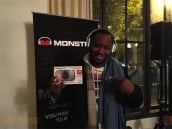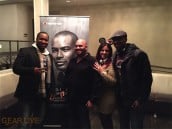Find Our Latest Video Reviews on YouTube!
If you want to stay on top of all of our video reviews of the latest tech, be sure to check out and subscribe to the Gear Live YouTube channel, hosted by Andru Edwards! It’s free!
Latest Gear Live Videos
Why PS2 Succeeded, and Why PS3 Will Fail
Posted by Rob Stevens Categories: Editorial, Features, Video Games,
The Sony PlayStation 2 had a lot of things going for it when it launched in October of 2000. It would launch more than a year before Nintendo’s GameCube console, a head start that proved to extend the lifespan of the console far longer than the usual five years. Normally, launching a game console outside of that five-year cycle spelled disaster (just ask Sega), Sony managed to make it work, but it wasn’t by virtue of their games. The launch lineup for the PS2 was laughable, and would not improve for the majority of that first year. No, the PS2 sold for one reason and one reason only: including DVD movie playback cheaper than a dedicated DVD player.
At the time of the PS2 launch, a home DVD player retailed for about $399. Sony was selling the PS2 for $299, taking a significant loss on the hardware and expecting to make it up on software sales (often described as the standard game industry model, despite Nintendo not following that model themselves). For the first year, Sony was taking an absolute bath on the PS2 hardware, since the initial software selection was pitiful, yet the installed user base for the machine would pay dividends in the years to come, allowing Sony to secure many exclusives.
Click to continue reading Why PS2 Succeeded, and Why PS3 Will Fail
Gallery: Why PS2 Succeeded, and Why PS3 Will Fail
Advertisement
No “Free Press” In Game Industry
Posted by Rob Stevens Categories: Editorial, Features, Video Games,
Hey Dave…still want to know why there’s no real journalism in the video game industry? It’s because of stories like this, and like this, and like this.
How on earth are you supposed to have a “free press” in the game industry when the companies that admittedly support its existence are constantly trying to keep all of the news under wraps? I suspect that in at least one of these recent cases of IGN pulling content, a deal was brokered for an exclusive in exchange for pulling the content, but when are these companies going to learn that you can’t put the genie back in the bottle?
The games industry is one where companies have seen rampant “idea theft”, concepts shown early to generate buzz which proceed to get ripped off eight ways from Sunday by less talented development houses able to rush a competing product to market. Nintendo was such a victim of this particular tactic (specifically after showing off Super Mario 64 for the first time), that they have become the most secretive company in all of the game industry. So I get it, I understand why these companies want to keep their secrets under wraps ... it’s a matter of securing their revenue stream, and I can respect that.
Click to continue reading No “Free Press” In Game Industry
Gallery: No “Free Press” In Game Industry
A Look At Why Xbox Live Marketplace Licensing and DRM Doesn’t Work

Posted by Andru Edwards Categories: Editorial, Microsoft, Video Games,

A few months ago on The Bleeding Edge, we made mention of how horrible the experience of getting your Xbox 360 repaired can be as it pertains to the content you have downloaded from Xbox Live Marketplace. Ben Salem over at the Xbox Team Blog wrote up an entry talking about how the licensing for Xbox Live Marketplace content works, hoping to explain why some users have problems as it pertains to the DRM implementation of the Xbox 360.
When an item is purchased and subsequently downloaded for the first time, licenses to use the downloaded content are created and passed out to two separate locations. First, a license is created and issued to the console. This license enables all accounts to use this content freely, as long as the content is being accessed from said console – any profile being used on the console will be able to use the content while on the console.
Second, a license is created and issued to the profile used to purchase the item. This license is different in that it allows the profile to use the content on whichever console it currently resides on, but only if it is connected to live. Only the signed-in account can use the paid-for content – a license would have to be purchased on that console for everyone to be able to play. This seems to be where some people are getting tripped up – bringing a profile with a license on it to another console will not give the second console a license as well.
The problem with this is that when a user has to send in their Xbox for repair (and we know a bunch of different people who have had to, including myself), it seems more often than not they are just sent a replacement unit.
Click to continue reading A Look At Why Xbox Live Marketplace Licensing and DRM Doesn’t Work
Gallery: A Look At Why Xbox Live Marketplace Licensing and DRM Doesn’t Work
Bleeding Edge Byte 014: A Horrific Xbox 360 Purchasing Experience

Posted by Andru Edwards Categories: Editorial, Features, Video Games, Videocasts,
In this special Sparky’s Story Hour, Sparky details what happened when he attempted to buy an Xbox 360 from Wal-Mart, and whole-heartedly begs you to reconsider if Wal-Mart is the only place that has one in stock near you. From silly down-selling from the retailer, to the associate and their manager not being able to scan a copy of Oblivion, to paying over $1,000 for an Xbox, this is one tale you need to hear.
Here’s how to get the show:
Subscribe: iTunes iPod / H.264 | iTunes MPEG-4 | RSS iPod Feed | RSS MPEG-4 Feed
|Download| - iPod-formatted H.264 (Mirror)
|Download| - DivX (Mirror)
|Download| - MPEG-4 (Mirror)
|Download| - PSP (Mirror)
 IMPORTANT: We are surveying the viewers of our show to see what it is that people like, and more importantly, what they don’t like. It is anonymous, and just takes a couple of minutes. If you have the time, we would appreciate it! As always, feel free to let us know what you think in the comments.
IMPORTANT: We are surveying the viewers of our show to see what it is that people like, and more importantly, what they don’t like. It is anonymous, and just takes a couple of minutes. If you have the time, we would appreciate it! As always, feel free to let us know what you think in the comments.
|Download| - iPod-formatted H.264
|Download| - MPEG-4
Gallery: Bleeding Edge Byte 014: A Horrific Xbox 360 Purchasing Experience
RemoteCalendars - Synchronize Google Calendar With Outlook
Posted by John Goulden Categories: Editorial, Google, Microsoft, Software,
 Google continues to draw users with its suite of applications that can be accessed from practically anywhere you can access the Internet. One such application, Google Calendar, is especially nice as it helps answer the eternal question that friends and family members inevitably ask - “when are you free?”. With a shared version of the Google Calendar they can answer their own question, but its lack of offline use and portability leaves a little something to be desired.
Google continues to draw users with its suite of applications that can be accessed from practically anywhere you can access the Internet. One such application, Google Calendar, is especially nice as it helps answer the eternal question that friends and family members inevitably ask - “when are you free?”. With a shared version of the Google Calendar they can answer their own question, but its lack of offline use and portability leaves a little something to be desired.
It turns out that there’s a solution to the problem for those of us who use Microsoft Outlook as our personal information manager. RemoteCalendars is an open source plugin that allows you to import iCalendar-based files into Outlook, and with the latest release of version 5.61, allows you to perform two-way synchronization as well. RemoteCalendars is still a work in progress, but if you follow the instructions implicitly, there’s a fair chance it will work as well for you as it did for me.
Read More  | RemoteCalendars
| RemoteCalendars
Gallery: RemoteCalendars - Synchronize Google Calendar With Outlook
 I’m not an expert in branding or picking product names, but as I thought about the ramifications of Nintendo’s choice of product name for their next console (Wii, in case you missed it), I’ve been thinking more and more about what a terrible choice it was.
I’m not an expert in branding or picking product names, but as I thought about the ramifications of Nintendo’s choice of product name for their next console (Wii, in case you missed it), I’ve been thinking more and more about what a terrible choice it was.
First, Nintendo released a one-sheet explaining the name. This includes how it’s pronounced, what it means, and their ‘vision’. It strikes me that if you have to go to all that trouble, you picked the wrong name. The name should just resonate. People should be able to feel it right away, and the pronounciation should be clear.
The Big N explained the decision behind the name in a statement, which we’ve provided for your reading pleasure:
Introducing… Wii.
As in “we.”While the code-name Revolution expressed our direction, Wii represents the answer. Wii will break down that wall that seperates videogame players from everybody else. Wii will put people more in touch with their games… and each other. But you’re probably asking: What does the name mean?
Wii sounds like “we,” which emphasizes the console is for everyone. Wii can easily be remembered by people around the world, no matter what language they speak. No confusion. No need to abbreviate. Just Wii.
Wii has a distinctive “ii” spelling that symbolizes both the unique controllers and the image of people playing it. And Wii, as a name and a console, brings something revolutionary to the world of videogames that sets it apart from the crowd.
So that’s Wii. But now Nintendo needs you. Because it’s really not about you or me. It’s about Wii. And together, Wii will change everything.
Click to continue reading Wii: Thoughts On Product Naming
Gallery: Wii: Thoughts On Product Naming
Meedio Sold To Yahoo
Posted by John Goulden Categories: Corporate News, Editorial, Home Entertainment, Software,
![]() Depending on your point of view, the fact that Meedio has sold off its technology and intellectual property to Yahoo!, falls somewhere between “another one bites the dust” and “the greatest thing since sliced bread”. Meedio, for those of you not in the know, was a media center application that started life as myHTPC. When myHTPC was in full swing I remember tinkering with and coaxing it into life, but in the end moved away from the platform to Windows Media Center. Although Windows MCE didn’t originally have the depth and breadth of scope that myHTPC (and eventually Meedio) encompassed, what enticed me was the ability to get it up and running with minimal fuss. After all, the time saved in setup and configuration allowed more time for enjoyment of the media center, and additionally allowed more time for the million other projects I always seem to have cooking.
Depending on your point of view, the fact that Meedio has sold off its technology and intellectual property to Yahoo!, falls somewhere between “another one bites the dust” and “the greatest thing since sliced bread”. Meedio, for those of you not in the know, was a media center application that started life as myHTPC. When myHTPC was in full swing I remember tinkering with and coaxing it into life, but in the end moved away from the platform to Windows Media Center. Although Windows MCE didn’t originally have the depth and breadth of scope that myHTPC (and eventually Meedio) encompassed, what enticed me was the ability to get it up and running with minimal fuss. After all, the time saved in setup and configuration allowed more time for enjoyment of the media center, and additionally allowed more time for the million other projects I always seem to have cooking.
Although it’s sad to see Meedio go the way of the corporate giant, it’s far better than the fate that another media center pioneer, ShowShifter, met with . . . non-existence altogether. Unfortunately, for current users of Meedio your official support options have ceased to exist effective immediately, and while Yahoo! didn’t technically purchase the existing Meedio product, they have everything else. Depending on what Yahoo! does with Meedio’s technology and how long it takes, it leaves the current media center market open mainly to Microsoft, MythTV and SnapStream.
Read More  | Meedio via Zatz Not Funny
| Meedio via Zatz Not Funny
Gallery: Meedio Sold To Yahoo
So, let’s be honest - we have all heard of RFID technology by now. To further your education, Spychips is a site dedicated to informing the masses against the possible dangers that exist with this new technology. RFID has infiltrated everyday life, unbeknownst to most. Stores like Wal-Mart use RFID for things like inventory management, and as an anti-theft device. Some of the things that Spychips.com reports on are a bit one sided, but its interesting to see how this technology could be potentially damaging to our privacy. If you do not look out for your civil liberties, and privacy, no one else will.
Read More  | SpyChips
| SpyChips
Gallery: RFID, Savior or Curse?
Technology Is Wonderful - When It Works
Posted by John Goulden Categories: Smartphones, Editorial, Features, Internet, Misc. Tech,

As you may or may not be aware, a severe storm ripped through the Midwest and caused an as-of-yet untotaled amount of damage, as well as personal injury and loss of life. One such city, that in the past seemed immune to tornado-generating storms, is Springfield, Illinois, the state’s capital.
A pair of tornados ripped through the city late Sunday night, leaving a trail of destruction in their wake. At one point, most of the city was without power, and there are still areas where electrical service has not been restored (my house being one of those.) Initially the lack of electricity didn’t appear to be a big deal till it became obvious that it was not coming back anytime soon.
Click to continue reading Technology Is Wonderful - When It Works
















